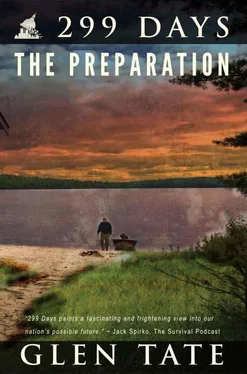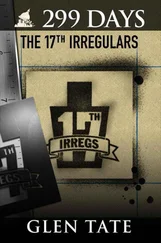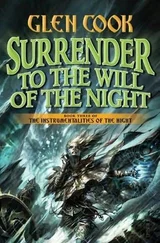Glen Tate - 299 Days - The Preparation
Здесь есть возможность читать онлайн «Glen Tate - 299 Days - The Preparation» весь текст электронной книги совершенно бесплатно (целиком полную версию без сокращений). В некоторых случаях можно слушать аудио, скачать через торрент в формате fb2 и присутствует краткое содержание. Город: Augusta, ME, Год выпуска: 2012, ISBN: 2012, Издательство: PrepperPress, Жанр: sf_postapocalyptic, на английском языке. Описание произведения, (предисловие) а так же отзывы посетителей доступны на портале библиотеки ЛибКат.
- Название:299 Days: The Preparation
- Автор:
- Издательство:PrepperPress
- Жанр:
- Год:2012
- Город:Augusta, ME
- ISBN:978-0615680682
- Рейтинг книги:3 / 5. Голосов: 1
-
Избранное:Добавить в избранное
- Отзывы:
-
Ваша оценка:
- 60
- 1
- 2
- 3
- 4
- 5
299 Days: The Preparation: краткое содержание, описание и аннотация
Предлагаем к чтению аннотацию, описание, краткое содержание или предисловие (зависит от того, что написал сам автор книги «299 Days: The Preparation»). Если вы не нашли необходимую информацию о книге — напишите в комментариях, мы постараемся отыскать её.
299 Days: The Preparation
299 Days: The Preparation — читать онлайн бесплатно полную книгу (весь текст) целиком
Ниже представлен текст книги, разбитый по страницам. Система сохранения места последней прочитанной страницы, позволяет с удобством читать онлайн бесплатно книгу «299 Days: The Preparation», без необходимости каждый раз заново искать на чём Вы остановились. Поставьте закладку, и сможете в любой момент перейти на страницу, на которой закончили чтение.
Интервал:
Закладка:
Sometimes, Grant would go to the cabin for just a few hours. It was only forty minutes from his house, so he could swing out there, sometimes at lunch time. He got to work at about 6:00 a.m. and often stayed late, so he figured he could take a two-hour lunch. Besides, no one really kept track of what he did all day. Other times, he’d stay most of the weekend out at the cabin. overnight. Cole liked coming out, too. He loved throwing rocks into the water for hours. He also liked playing his handheld video games there. Grant refused to get a TV at the cabin, so Cole couldn’t bring out his bigger video games that used one. Manda loved the campfire and cooking things in the cast iron pie irons on the coals. It was great to have a place where his kids could make such lasting childhood memories. Sometimes Grant thought about how much better his kids had it than he did as child, and he would tear up. He was being a good dad. He was taking care of his family.
But, to completely take care of his family, Grant needed to prep. This meant food storage, the cabin, guns and training, and creating networks of people with skills they would need to survive when the normal things no longer worked.
When it came to prepping, people are more important than stuff. The Team was an example of how important people were when planning for shit hitting the fan. One person couldn’t know everything, but someone in the group probably knew how to do whatever it was that needed to be done. The idea that a “survivalist” is some weird guy alone in a bunker with cases of military rations MREs was a Hollywood creation to sensationalize a story. There was no way to pull off survival completely independently; trusted communities were critical.
During peacetime, for example, a person would just take their car to a mechanic. But during a collapse, mechanics might not be around, or there may be no way to pay them. To accomplish everyday things, like repairing a car would require people to develop the skills themselves — or, more likely, developing relationships and trading with others.
Grant’s cabin neighbors were a natural starting place for creating a trusted small community. He needed to get to know them and see if he could trust them with his life and his family’s life. It could take years to build up these relationships, and Grant worried he didn’t have years before a collapse hit.
Grant had a few neighbors out there at the end of the Pierce Point development. His cabin was relatively isolated but with a few people around; the perfect combination for a bug out location.
The cabin was almost at the end of a little gravel road called Over Road. There were four houses and one RV before Grant’s cabin, and then two more cabins past his. The four houses and RV were owned by part-time residents like him. The two houses past his were owned by year-round residents.
One of the two houses past his cabin, and the house closest to him, was owned by Mark Colson. Mark’s place was across the road from Grant’s on the hill overlooking Grant’s cabin and the water. Looking down Over Road, Mark’s house was on the right up on the hill and Grant’s was on the left down toward the water.
Mark lived there year-round, unlike most of the people down by the water in Pierce Point. He was a great guy. He was in his fifties, owned real estate in the area, and was semi-retired. He was a hillbilly, though, a country boy through and through.
When Mark first met Grant, he assumed the new owners of the cabin would probably be uptight city people. Grant driving up for the first time in an Acura didn’t help. The first time they met, Grant saw the USMC sticker on Mark’s black Silverado pickup and the conversation went to guns. It turned out that Mark was a former Marine sniper. Could Grant have a better neighbor?
Grant started to chalk this up to the many “coincidences” he was experiencing. But he stopped himself. It wasn’t that unusual for a guy living in the country to be a country boy. Grant considered Mark to be luck instead of a full-on “coincidence” indicating that Grant had been placed in a particular place at a particular time for a particular role. Grant was always on guard, telling himself not to consider every good thing to be a full-on “coincidence” that pointed to something bigger. That would dilute the real “coincidences” and cheapen their impact. You’ll know a full-on “coincidence” when you see one, he told himself. Inheriting the cabin was one.
Mark really liked Grant and thought it was refreshing that a lawyer could be a fellow hillbilly. Mark watched Grant’s place when Grant wasn’t there. He invited Grant out hunting and fishing with him; Mark loved to seed Grant’s beach with oysters. Grant was more than happy to have him do that, and let Mark dig all the clams he wanted on Grant’s beach. Grant borrowed tools from Mark.
The first Christmas at the cabin, Grant got Mark several bottles of “Jar Head Red” wine for the former Marine who, Grant noticed, liked to drink wine. That sealed their friendship.
Mark lived there with his wife, Tammy. She was nice; a basic country girl. She worked for the local power company. Their son, Paul, lived with them. He was in his mid-twenties. Paul was recently divorced and had custody of his daughter, Missy, who was in kindergarten. From what Grant could piece together, Paul’s wife was a druggie.
Paul was fat. Not heavy, but obese. He must have weighed 300 pounds. He got winded walking around. He was a very unhappy guy.
Although he was really nice, Paul had been beaten down by life, mostly by his wife and being a male trying to get custody of a child in the courts. He was in the local community college in the welding program.
The next house over, and the last house on Over Road, was owned by the Morells. They lived there year-round, like the Colsons.
John Morell was a retired millwright for the local lumber mill, which was now closed. Grant had never heard the term before, and he learned that a millwright is a cross between an engineer and a construction worker. The term came from when a mill needed to be moved. A millwright would figure out how to take apart the mill, move it, and put it back together.
John was a master carpenter, a good electrician, could weld, and knew heating and cooling systems. He was another amazing neighbor with incredibly valuable skills. This was getting weird, Grant thought. He smiled at his luck. Then he got serious. He started to think about all the help he would need for what could be coming. He was grateful for all the amazing coincidences, but he realized how hard it would be to do what needed to be done. The coincidences just made it possible, not easy.
John’s wife, Mary Anne, was a retired school teacher. She was a country girl. She loved canning and baking. She had a nice little garden. It was more decorative than food producing, but it was a garden, nonetheless.
John began to view Grant as the son he never had. He loved teaching Grant how to fix things. After Grant had owned the cabin for about a year, they had “the conversation.”
Grant was at John’s house having a beer with him after he had shown Grant how to turn off the water meter at the cabin. John looked at him very seriously and said, “You know, Grant, we’re living in a false economy.” Grant knew exactly what John was saying.
“We sure are,” Grant said, lifting up his beer to emphasize the point. “The size of this government is completely unsustainable. People are so dependent. They have no idea how to take care of themselves.” That was about the extent of the normal political conversation a person could have without showing they were a “survivalist.”
Grant decided to take the conversation one step further than the usual “safe” conversation. He looked at John and said, “I wonder what people would do if semi-trucks quit delivering things for a week or so.” Grant waited for the reaction. It was like speaking in code.
Читать дальшеИнтервал:
Закладка:
Похожие книги на «299 Days: The Preparation»
Представляем Вашему вниманию похожие книги на «299 Days: The Preparation» списком для выбора. Мы отобрали схожую по названию и смыслу литературу в надежде предоставить читателям больше вариантов отыскать новые, интересные, ещё непрочитанные произведения.
Обсуждение, отзывы о книге «299 Days: The Preparation» и просто собственные мнения читателей. Оставьте ваши комментарии, напишите, что Вы думаете о произведении, его смысле или главных героях. Укажите что конкретно понравилось, а что нет, и почему Вы так считаете.











